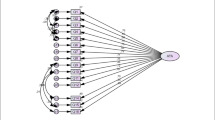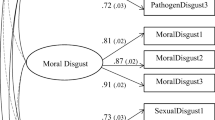Abstract
The current study proposes an extension of theory and research on the effect of status threat specific to heterosexual men’s anti-gay slurs usage. Drawing on both the Precarious Manhood Thesis and the Coalitional Value Theory, the current study investigates whether masculine personality traits moderate the association between status threat and men’s readiness to use anti-gay slurs. A sample of heterosexual male university students (N = 139) was recruited from two English-speaking universities in Montreal, Quebec, and Houston, Texas. Participants completed questionnaires and randomly received either status threatening or status confirming feedback. Next, after reading vignettes describing heterosexual men behaving in ways that might jeopardize their status, participants reported their estimated probability of calling the target character a “fag” or “faggot.” Findings revealed a significant interaction effect. That is, only among participants high in masculine personality traits, those in the threat condition indicated significantly greater readiness to use anti-gay slurs relative to those in the status affirmation group. These findings contribute to a more comprehensive understanding of men’s anti-gay slur usage grounded in a status striving motive paired with distinct personality features. Future research directions are discussed.

Similar content being viewed by others
Data Availability
The dataset that supports the findings of the current study is available from the corresponding author upon reasonable request.
Notes
Although previous studies have used the term masculinity threat, this study considers the threat involved in masculinity threat as principally fixed in social status due, in part, to Buss et al.’s (2020) finding that acting masculine (or feminine) has robust cross-cultural sex-differentiated status consequences.
References
Aiken, L., & West, S. (1991). Multiple regression: Testing and interpreting interactions. Sage.
Anderson, C., Hildreth, J. A. D., & Howland, L. (2015). Is the desire for status a fundamental human motive? A review of the empirical literature. Psychological Bulletin, 141(3), 574–601.
Anderson, C., Hildreth, J. A. D., & Sharps, D. L. (2020). The possession of high status strengthens the status motive. Personality & Social Psychology Bulletin, 46(12), 1712–1723.
Bandura, A. (1977). Social learning theory. Prentice Hall.
Barclay, P. (2006). Reputational benefits for altruistic punishment. Evolution and Human Behavior, 27(5), 325–344.
Bem, S. L. (1974). The measurement of psychological androgyny. Journal of Consulting & Clinical Psychology, 42(2), 155–162.
Bosson, J. K., Vandello, J. A., Burnaford, R. M., Weaver, J. R., & Wasti, A. (2009). Precarious manhood and displays of physical aggression. Personality & Social Psychology Bulletin, 35(5), 623–634.
Bosson, J. K., & Vandello, J. A. (2011). Precarious manhood and its links to action and aggression. Current Directions in Psychological Science, 20(2), 82–86.
Buss, D. M. (2009). How can evolutionary psychology successfully explain personality and individual differences? Perspectives on Psychological Science, 4(4), 359–366.
Buss, D. M. (2019). Evolutionary psychology: The new science of the mind (6th ed.). Routledge.
Buss, D. M., Durkee, P. K., Shackelford, T. K., et al. (2020). Human status criteria: Sex differences and similarities across 14 nations. Journal of Personality & Social Psychology, 119(5), 979–998.
Carnaghi, A., & Bianchi, M. (2017). Group labeling. In H. Giles & J. Harwood (Eds.), Encyclopedia of intergroup communication. Oxford University Press.
Cheng, J. T., Tracy, J. L., & Henrich, J. (2010). Pride, personality, and the evolutionary foundations of human social status. Evolution and Human Behavior, 31(5), 334–347.
Cheng, J. T., Tracy, J. L., Foulsham, T., Kingstone, A., & Henrich, J. (2013). Two ways to the top: Evidence that dominance and prestige are distinct yet viable avenues to social rank and influence. Journal of Personality & Social Psychology, 104(1), 103–125.
Eisler, R. M., & Skidmore, J. R. (1987). Masculine gender role stress: Scale development and component factors in the appraisal of stressful situations. Behavior Modification, 11(2), 123–136.
Fehr, E., & Gächter, S. (2002). Altruistic punishment in humans. Nature, 415(6868), 137–140.
Fone, B. (2000). Homophobia: A history. Henry Holt and Company.
Geary, D. C., Byrd-Craven, J., Hoard, M. K., Vigil, J., & Numtee, C. (2003). Evolution and development of boys’ social behavior. Developmental Review, 23(4), 444–470.
Geary, D. C. (2020). Male, female: The evolution of human sex differences (3rd ed.). American Psychological Association.
Gul, P., & Uskul, A. K. (2021). An alternative account of anti-effeminacy bias: Reputation concerns and lack of coalitional value explain honor-oriented men’s reluctance to befriend feminine men. Personality & Social Psychology Bulletin, 47(8), 1223–1248.
Hahn, U. (2011). The problem of circularity in evidence, argument, and explanation. Perspectives on Psychological Science, 6(2), 172–182.
Hayes, A. (2018). Introduction to mediation, moderation, and conditional process analysis: A regression-based approach (2nd ed.). Guilford Press.
Heine, S. J., Proulx, T., & Vohs, K. D. (2006). The meaning maintenance model: On the coherence of social motivations. Personality and Social Psychology Review, 10(2), 88–110.
Kim, H. Y., & Pettit, N. C. (2015). Status is a four-letter word: Self versus other differences and concealment of status-striving. Social Psychological and Personality Science, 6(3), 267–275.
Lamarche, V. M., Atkinson, C., & Croft, A. (2021). A cognitive uncoupling: Masculinity threats and the rejection of relationship interdependence. Social Psychological and Personality Science, 12(6), 920–929.
McDonald, M. M., Navarrete, C. D., & Van Vugt, M. (2012). Evolution and the psychology of intergroup conflict: The male warrior hypothesis. Philosophical Transactions of the Royal Society B: Biological Sciences, 367(1589), 670–679.
McIntyre, M. H., Li, A. Y., Chapman, J. F., Lipson, S. F., & Ellison, P. T. (2011). Social status, masculinity, and testosterone in young men. Personality & Individual Differences, 51(4), 392–396.
Meyer, I. H. (2003). Prejudice, social stress, and mental health in lesbian, gay, and bisexual populations: Conceptual issues and research evidence. Psychological Bulletin, 129(5), 674–697.
Mitchell, R. W., & Ellis, A. L. (2011). In the eye of the beholder: Knowledge that a man is gay promotes American college students’ attributions of cross-gender characteristics. Sexuality & Culture, 15(1), 80–99.
Morrison, M. A., & Morrison, T. G. (2002). Development and validation of a scale measuring modern prejudice toward gay men and lesbian woman. Journal of Homosexuality, 43(2), 15–37.
Newcomb, M. E., & Mustanski, B. (2010). Internalized homophobia and internalizing mental health problems: A meta-analytic review. Clinical Psychology Review, 30(8), 1019–1029.
Pascoe, C. J. (2005). “Dude, you’re a fag”: Adolescent masculinity and the fag discourse. Sexualities, 8(3), 329–345.
Petersen, M. B., Osmundsen, M., & Bor, A. (2021). Beyond populism: The psychology of status-seeking and extreme political discontent. In J. Forgas, W. D. Crano, & K. Fiedler (Eds.), The psychology of populism: The tribal challenges to liberal democracy (pp. 62–80). Routledge.
Pinker, S. (2011). The better angels of our nature: Why violence has declined. Viking.
Plummer, D. C. (2001). The quest for modern manhood: Masculine stereotypes, peer culture and the social significance of homophobia. Journal of Adolescence, 24(1), 15–23.
Price, M. E., Cosmides, L., & Tooby, J. (2002). Punitive sentiment as an anti-free rider psychological device. Evolution and Human Behavior, 23(3), 203–231.
Proulx, T., & Heine, S. J. (2010). The frog in Kierkegaard’s beer: Finding meaning in the threat-compensation literature. Social & Personality Psychology Compass, 4(10), 889–905.
Redhead, D., Dhaliwal, N., & Cheng, J. T. (2021). Taking charge and stepping in: Individuals who punish are rewarded with prestige and dominance. Social & Personality Psychology Compass, 15(2), e12581.
Reigeluth, C. S., & Addis, M. E. (2016). Adolescent boys’ experiences with policing of masculinity: Forms, functions, and consequences. Psychology of Men & Masculinity, 17(1), 74–83.
Saucier, D. A., Stanford, A. J., Miller, et al. (2016). Masculine honor beliefs: Measurement and correlates. Personality & Individual Differences, 94, 7–15.
Smith, E. A. (2010). Communication and collective action: Language and the evolution of human cooperation. Evolution and Human Behavior, 31(4), 231–245.
Vandello, J. A., & Bosson, J. K. (2013). Hard won and easily lost: A review and synthesis of theory and research on precarious manhood. Psychology of Men & Masculinity, 14(2), 101–113.
Wassersug, R. J., & Hamilton, L. D. (2018). Masculinity in milliseconds: An evolutionary & neurophysiological perspective on expressions of masculinity. Adaptive Human Behavior & Physiology, 4(2), 152–170.
Whitley, R., & Zhou, J. (2020). Clueless: An ethnographic study of young men who participate in the seduction community with a focus on their psychosocial well-being and mental health. PLoS One, 15(2), e0229719.
Willer, R., Rogalin, C. L., Conlon, B., & Wojnowicz, M. T. (2013). Overdoing gender: A test of the masculine overcompensation thesis. American Journal of Sociology, 118(4), 980–1022.
Winegard, B. M., Winegard, B., & Geary, D. C. (2014). Eastwood's brawn and Einstein's brain: An evolutionary account of dominance, prestige, and precarious manhood. Review of General Psychology, 18(1), 34–48.
Winegard, B., Reynolds, T., Baumeister, R. F., & Plant, E. A. (2016). The coalitional value theory of antigay bias. Evolutionary Behavioral Sciences, 10(4), 245–269.
Winegard, B., Kirsch, A., Vonasch, A., Winegard, B., & Geary, D. C. (2020). Coalitional value theory: An evolutionary approach to understanding culture. Evolutionary Psychological Science, 6(4), 301–318.
Funding
The present study was funded by the Social Sciences and Humanities Research Council of Canada.
Author information
Authors and Affiliations
Corresponding author
Ethics declarations
Ethics Approval
Approval was obtained from the ethics committees of McGill University and University of Houston.
Consent to Participate
Informed consent was obtained from all individual participants included in the study.
Conflict of Interest
The authors declare that they have no conflict of interest.
Additional information
Publisher’s note
Springer Nature remains neutral with regard to jurisdictional claims in published maps and institutional affiliations.
Supplementary Information
ESM 1
(84.4 KB)
Rights and permissions
About this article
Cite this article
Brown, T.L., Smith, N.G. Experimentally testing the impact of status threat on heterosexual men’s use of anti-gay slurs: A precarious manhood and coalitional value perspective. Curr Psychol 42, 11891–11901 (2023). https://doi.org/10.1007/s12144-021-02489-7
Accepted:
Published:
Issue Date:
DOI: https://doi.org/10.1007/s12144-021-02489-7




